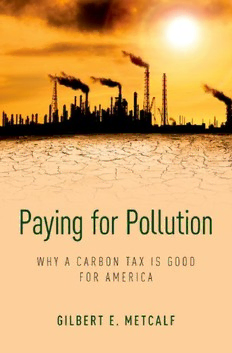
Paying for Pollution: Why a Carbon Tax Is Good for America PDF
Preview Paying for Pollution: Why a Carbon Tax Is Good for America
Paying for Pollution Paying for Pollution Why a Carbon Tax is Good for America Gilbert E. Metcalf 1 1 Oxford University Press is a department of the University of Oxford. It furthers the University’s objective of excellence in research, scholarship, and education by publishing worldwide. Oxford is a registered trade mark of Oxford University Press in the UK and certain other countries. Published in the United States of America by Oxford University Press 198 Madison Avenue, New York, NY 10016, United States of America. © Oxford University Press 2019 All rights reserved. No part of this publication may be reproduced, stored in a retrieval system, or transmitted, in any form or by any means, without the prior permission in writing of Oxford University Press, or as expressly permitted by law, by license, or under terms agreed with the appropriate reproduction rights organization. Inquiries concerning reproduction outside the scope of the above should be sent to the Rights Department, Oxford University Press, at the address above. You must not circulate this work in any other form and you must impose this same condition on any acquirer. CIP data is on file at the Library of Congress ISBN 978– 0– 19– 069419– 7 9 8 7 6 5 4 3 2 1 Printed by Sheridan Books, Inc., United States of America For Simon and Calvin CONTENTS Preface ix Introduction: Why This Book? 1 1. Climate Change: What’s the Big Deal? 7 2. Business as Usual: What Are the Costs? 23 3. Why Do Economists Like a Carbon Tax? 35 4. Isn’t There a Better Way? (No, There Isn’t) 53 5. Cap and Trade: The Other Way to Price Pollution 73 6. What to Do with $200 Billion: Give It Back 87 7. So You Want a Carbon Tax: How Do You Design It? 99 8. Objections to a Carbon Tax 115 9. Enacting a Carbon Tax: How Do We Get There? 129 What Next? 141 Notes 143 References 165 Index 177 PREFACE According to Nathanial Hawthorne, “Easy reading is damn hard writing.” That is especially true when writing a book on a technical subject for a gen eral audience. In writing this book, I have deliberately avoided the math ematical tools and conventions that economists fall back on in academic writing. Readers need not fear that they will see complicated equations, derivatives, stochastic calculus, or other hight ech tools of modern eco nomics. Instead, I have tried to write a book that is accessible to any person interested in the issue of climate change and in how our government should respond to this threat. I took this approach to reach as wide an audience as possible in hopes of influencing debate over climate policy. At the same time, I have provided extensive endnotes and references for readers who want to see the research that underpins this book.1 I have carried out research on climate change policy for roughly twenty years now. Nearly all of that work informs this book. I have benefitted greatly from conversations with Joe Aldy, Dallas Burtraw, Kelly Sims Gallagher, Marc Hafstead, Ted Halstead, Kevin Hassett, Captain William Holt, USCG, Ret., Chris Knittel, Ray Kopp, Henry Lee, Billy Pizer, John Reilly, Ricky Revesz, Rob Stavins, Jim Stock, Jerry Taylor, David Weisbach, and Rob Williams, among many others. They cannot be held responsible for any of the opinions I’ve expressed in this book. Those opinions are mine alone. Richard Forman, Jeff Greene, and Michael Klein have read drafts of this book and provided constructive suggestions for which I’m grateful. I wrote most of this book while on leave from the Department of Economics at Tufts University. I spent some of that time as a visiting scholar at the Mossavar Rahmani Center at Harvard’s Kennedy School of Government. My thanks to Larry Summers for extending the invita tion and to John Haigh and Scott Leland for making me welcome there.
